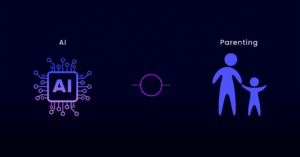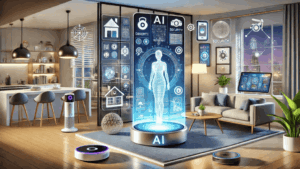Artificial intelligence (AI) is not merely a futuristic concept. Artificial intelligence (AI) is present in everyday life, permeating applications, advertisements, and even the gadgets you connect to. While AI could make your life easier, however, it creates serious issues regarding how much of our personal information is collected, stored, used, and accessed without our knowledge. Many people are unaware of the volume of data AI uses to “learn” about us. The more AI learns from our actions, the more it gains access to our digital footprint. This article will look at the ways that AI affects your privacy and the steps you can take to ensure your privacy in a digitally connected world.
Understanding AI and How It Learns:
AI (also known as artificial intelligence) is a form of technology created to replicate human brain function. It can learn from giant quantities of data, which include texts, images, and behavioral patterns. The mo The more data it processes, the more effective it becomes. This is why businesses supply AI machines with a vast amount of personal data. AI tools use this data to predict future events, suggest products, or look at patterns. The majority of the time, the process of learning takes place on the back end and without your explicit consent or understanding.
How AI Collects Your Data Silently:
Every time you visit the Internet, AI systems are silently watching your online activities. When you’re watching a movie or clicking on a link or even paused on aarticle,le AI is taking note. AI systems create profiles based on your behavior, routines, preferences, and habits. It’s sometimes difficult to tell if this occurs, which is why it’s salarming. . In the absence of any notifications or alerts, your digital activity is transformed into data that businesses could use, share, or sell.
Why App Permissions Shouldn’t Be Ignored:
It’s not uncommon to simply skip over the app’s permission screens and not read the details. However, these permissions could grant programs access to the camera, microphone, and your location. After you grant access, it usually continues to run in the background. AI uses the data collected through these permissions to track your travels, activities, and social interactions. Even the most innocent of apps may exceed their limits, all for “personalization.”
The Risks Hidden in Smart Homes:
These homes are futuristic-sounding and comfortable, with lighting that adjusts in real time, audio systems that react to your voice, and thermostats that can learn your preferences. These smart devices also provide detailed information regarding your everyday routine. When you get home, when you go to get up, and even the shows you enjoy watching—all of these are recorded and analyzed. AI makes use of the data to improve” your experience, but it also gives an online glimpse into your world, which hackers and businesses could take advantage of.
Voice Assistants May Always Be Listening:
Voice assistants such as Siri, Alexa, and Google Assistant are designed to enable hands-free communication. But their continuous listening to “wake words” means they may also record short snippets from conversations that are not intended to be recorded. Humans occasionally examine the recordings to enhance the AI. While this aims to enhance the AI’s accuracy, it also poses a significant privacy concern. You may think you’re completely in your home, but the mobile devices may be listening in on conversations even if you’ve never spoken to them in person.
Social Media Knows More Than You Think:
Every interaction you make on social media is a record point. We track comments, likes, shares, and content you choose not to view. AI algorithms analyze this information to determine the things that keep you engaged. In time, they can be able to discover your political beliefs as well as emotional triggers and even your mood. Social media platforms claim that they’re for personalization, but they can also result in manipulative and targeted messages without knowing the whole story.
Why Ads Feel Creepy Accurate:
Have you ever had a moment when you talked about something, and then you saw an advertisement for it? This is AI work. Although it might not be constantly listening, it is certainly keeping track of your history of searches or online purchases, as well as your current location. Advertisers make use of this information to provide you with ads that you are more likely to click on. It results in advertisements that seem personal, as they are tailored to your interests. AI recognizes your desires and needs more than you think.
Facial Recognition and Public Tracking:
The technology of facial recognition is becoming more popular in public spaces. It can identify you within the crowd, track your location, and monitor your movements in the city, airports, or shopping malls. While you can use it for protection, it also exposes you to unintentional spying. Artificial intelligence-powered surveillance cameras don’t require your permission to look at your face. This raises many questions about the lack of privacy in public areas.
AI Surveillance Is Everywhere Now:
Both companies and government agencies are increasing their surveillance systems with the help of AI. Cameras for surveillance, traffic cameras, and even sensors for retail stores today use AI to analyze behavior. They can spot “suspicious” movements, emotional expressions, and gestures. This type of surveillance was previously uncommon; however, it’s now becoming commonplace. In the majority of cases, people aren’t aware that they’re being watched, which is precisely the issue.
AI at Work May Be Watching You:
If you work from home or at an office, AI might already be monitoring your performance. Software that tracks the time spent on screens, keystrokes, and habits of communication is becoming more common. Some systems also analyze how you write emails and video calls to determine the tone. While some employers believe AI monitoring can help improve efficiency, others argue it could be intrusive. Incessant AI monitoring could turn your office into a place that is constantly under surveillance.
Your Online Identity Is Easy to Uncover:
Are you trying to remain anonymous on the internet? AI can determine your identity. It analyzes the way you type on your device, how you type, and when you connect to the internet. These tiny details assist AI systems in identifying an online identity for you. Even when you employ tools such as VPNs and privacy browsers, AI will often be able to operate over them. So, real privacy on the internet is becoming harder to attain.
Ethical Concerns Around AI and Privacy:
People are questioning the accuracy of the gathered information. Do companies have access to our personal information simply because they have the right to? Ethics-based AI is about being open about the use of data and requesting permission and observing limits. However, not all businesses adhere to these rules. In the absence of strict supervision, AI systems can cross boundaries that put the users in danger. This is why the ethical aspect of AI is among the most important debates in the world of technology today.
What Laws Are Being Made About AI Privacy?
Some countries are moving ahead by introducing new regulations. For instance, consider the GDPR law in the EU. This law allows people to view, access, and erase their personal data. In the U.S., a few states have similar laws; however, there’s no national protection for data as of yet. The issue is that AI technology is growing faster than governments are able to regulate it. It creates gaps where businesses can gather data without responsibility, which leaves users at risk.
How You Can Stay Safe From AI Overreach:
It’s not necessary to stop using technology to safeguard your privacy. Just be more aware of it. Begin by changing permissions for apps, removing location tracking, and switching off your voice devices when not making use of them. Utilize privacy-focused tools, such as encrypted messaging apps as well as VPNs. Make sure to carefully review the details regarding data privacy policies. Becoming informed is the very first step to getting back control over your data.
Conclusion:
AI isn’t the only threat However, it is something we should learn more about. The same technology that helps users shop, locate, and communicate can also invade our privacy. If you are aware and make small adjustments, you can protect your information without sacrificing the benefits of modern technology. The key is being aware and having the ability to act, not a worry. The more you know, the better you can protect your privacy.
FAQs:
1. Does AI monitor me without my knowing?
Yes, AI often gathers data from the background using apps, websites, or devices with no clear warnings.
2. Do smart devices constantly listen?
Many are built to respond to commands from a voice, but they may also be able to listen to conversations accidentally or even intentionally in certain cases.
3. Is it possible for AI to accurately identify me, even when I am utilizing the privacy tool?
Yes, AI can often re-identify users by analyzing typing patterns, device information, and other behaviors, even when they use VPNs or incognito mode.
4. Does it constitute a legal requirement for apps to store this amount of data?
It depends on the location. Some countries have strict laws, and others allow firms more flexibility in the collection of data.
5. What’s the most effective method to protect the privacy of my data?
Start by looking over and limiting your application’s permissions. It’s an easy way to block the unnecessary collection of data.




